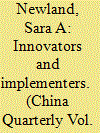| Srl | Item |
| 1 |
ID:
159824


|
|
|
|
|
| Summary/Abstract |
Early literature on China's civil society focused on organizations’ autonomy from the state. However, the precise ways in which these organizations are dependent on the state – and on individual officials – are less well understood. I argue that NGOs depend on different types of officials whose career incentives vary, with significant implications for relationships with non-state actors. One set of officials, innovators, seeks rapid promotion and uses civil society partnerships to gain higher-level attention. Innovators’ career goals lead them to provide support for NGOs; however, excessive reliance on innovators can force organizations to stray from their mission and can weaken their long-term position in a given locality. A second set of officials, implementers, seeks stability and security. Cognizant of the risks of partnering with non-state actors, these officials are sometimes forced by their superiors to engage with NGOs but see little personal benefit in doing so. These findings suggest the importance of China's multilevel political structure for state–society relations.
|
|
|
|
|
|
|
|
|
|
|
|
|
|
|
|
| 2 |
ID:
192548


|
|
|
|
|
| Summary/Abstract |
Although the importance of non-state actors in international relations is now widely acknowledged, formal state-to-state ties remain an essential measure of a state’s strength in the international community. When traditional components of sovereignty are eroded, what options remain open to states seeking to forestall international isolation? Drawing on a case study of Taiwan, this paper explores the potential and the pitfalls of using paradiplomacy as a substitute for traditional diplomacy. I argue that Taiwan uses paradiplomacy for three primary purposes: as a ‘hedge’ against weakness in the central-level US-Taiwan relationship; as a tool for developing long-term relationships with rising political stars; and as a performative strategy for asserting Taiwan’s statehood by showing others that it acts like a state. While paradiplomacy enables Taiwan to strengthen ties to US policymakers, these efforts have become increasingly complicated as mainland Chinese influence on local US politics increases. This paper thus sheds light on paradiplomacy in the US-Taiwan relationship, but also on the ways in which American federalism can complicate US foreign policy toward East Asia.
|
|
|
|
|
|
|
|
|
|
|
|
|
|
|
|
| 3 |
ID:
149741


|
|
|
|
|
| Summary/Abstract |
What have we learned from a decade of research on the provision of public goods in the Chinese countryside? This review article surveys the literature in political science, economics and Chinese area studies. It describes the three dominant types of explanations for variation in the quality of public goods: local elections, social sanctioning and economic policies. It then argues that these findings are plagued by a set of common problems. Scholars mean different things when they use the term “public goods,” making their findings difficult to compare. Furthermore, the most common measures of public goods ignore the ways in which local officials manipulate statistics to enhance their career prospects and the interconnected nature of geographic-administrative units in the Chinese state. I suggest some ways to address these problems, and make recommendations for new directions in research on the topic.
|
|
|
|
|
|
|
|
|
|
|
|
|
|
|
|